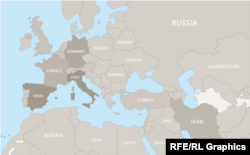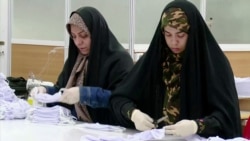The global coronavirus pandemic has infected more than 230,000 people worldwide, causing mass disruptions as governments continue to try to slow the spread of the new respiratory illness.
Here's a roundup of developments in RFE/RL's broadcast countries.
Iran
The death toll from the coronavirus in Iran continues to rise as the worst-affected country in the Middle East prepares for scaled-down celebrations of Norouz, the Persian New Year.
"With 149 new fatalities in the past 24 hours, the death toll from the virus has reached 1,284," Deputy Health Minister Alireza Raisi said on state television on March 19.
“Unfortunately, we have had 1,046 new cases of infection since yesterday,” Raisi added.
Iran has the third-highest number of registered cases after China and Italy.
Live Map: The Spread Of The Coronavirus
With the country reeling from the outbreak, officials have recommended that Iranians stay home during the March 20 holiday, a time when hundreds of thousands usually travel to be with friends and relatives.
The government has closed schools at all levels, banned sports and cultural events, and curtailed religious activities to try and slow the spread of the virus.
Kianoush Jahanpour, the head of the Health Ministry's public relations and information center , noted on March 19 that the data on the outbreak means an Iranian dies every 10 minutes from COVID-19, while 50 infections occur each hour of the day.
"With respect to this information, people must make a conscious decision about travel, traffic, transportation, and sightseeing," he added.
Despite the dire circumstances, many Iranians were angered by the temporary closure of Shi'ite sites, prompting some earlier this week to storm into the courtyards of two major shrines -- Mashhad's Imam Reza shrine and Qom's Fatima Masumeh shrine.
Crowds typically pray there 24 hours a day, seven days a week, touching and kissing the shrine. That's worried health officials, who for weeks ordered Iran's Shi'ite clergy to close them.
Earlier on March 19, officials announced that the country wouldn’t mark its annual day celebrating its nuclear program because of the outbreak.
Georgia
The Georgian government has ordered the closure of shops except grocery stores and pharmacies beginning March 20 to curb the spread of the coronavirus.
The measure, announced on March 19, also exempts gas stations, post offices, and bank branches. The South Caucasus country has so far reported 40 confirmed cases of COVID-19, the respiratory illness caused by the coronavirus, and no deaths.
Prime Minister Giorgi Gakharia on March 19 said he would declare a state of emergency, as many countries in Europe already have, if health authorities advise him to do so.
"As of today, I would like to emphasize that there is no need for this. However, in agreement with the president, we have decided, as soon as that need arises, that we will be able to make this decision within a few hours," he said.
Romania
President Klaus Iohannis has urged Romanians working abroad to refrain from traveling home for the Orthodox Easter amid fears of a worsening of the coronavirus outbreak in the country.
Romania has been under a 30-day state of emergency since March 16.
Iohannis made the appeal in a televised speech on March 19 as thousands of workers returning from Western Europe were slowly crossing into Romania after having clogged Hungary's borders both to the west and the east for two days in a row.
Romania is the European Union's second-poorest country, and at least 4 million Romanians work abroad, according to estimates.
The bottlenecks were worsened by Hungary's decision to close its borders on very short notice from March 17 at midnight -- a measure relaxed by Budapest after consultations with the Romanian government.
"Romanians from abroad are dear to us, and we long to be with them for Easter," Iohannis said. "However, that won't be possible this year.... We must tell them with sadness but also with sincerity not to come home for the holidays," he added.
Some 12,500 mostly Romanian travelers had crossed into Romania in 4,600 vehicles as of the morning of March 19, Romanian border police said.
They said 180 people were immediately quarantined, while some 10,000 were ordered into self-isolation once they reached their destinations.
The rest were mostly travelers in transit toward Moldova and Bulgaria, according to the police.
Romania has confirmed 277 coronavirus cases.
One of the patients is in serious condition in intensive care, while 25 people have recovered, according to health authorities.
No deaths have been reported so far.
However, authorities are concerned that the massive number of Romanians returning, mostly from Italy and Spain -- the European countries most affected by the coronavirus pandemic -- will lead to a spike in infections in the run-up to Orthodox Easter on April 19.
The Romanian military has started building an emergency hospital in Bucharest amid fears that the country's crumbling health-care system will not be able to cope with the outbreak.
Ukraine
Some 900 Ukrainians are embarking on March 19 on a train journey from Prague to Kyiv as part of an evacuation plan amid the coronavirus pandemic.
The train is set to travel through the Czech Republic and Poland, where it will make a stop at Przemysl, before heading to the western Ukrainian city of Lviv and the capital.
Yevhen Perebiynis, the Ukrainian ambassador to Prague, tweeted that more than 3,000 Ukrainians residing in the Czech Republic had asked to be evacuated.
Meanwhile, the mayor of Zhytomyr, Serhiy Sukhomlyn, said the city located 140 kilometers west of Kyiv recorded its first coronavirus infection.
Sukhomlyn said the patient, aged 56, had recently returned from Austria.
As of March 19, there were 21 confirmed cases of the respiratory illness in six regions and the capital, Kyiv, the Health Ministry said.
Meanwhile, Ukraine recorded its third death linked to COVID-19 in the western Ivano-Frankivsk region.
An elderly woman died one day after visiting a hospital with severe flu-like symptoms, according to the Health Ministry.
Russia
Russian officials have reported the country's first death connected to the coronavirus outbreak, but quickly backtracked, saying an elderly woman perished due to a detached blood clot.
The Moscow health department said on March 19 that the 79-year-old, who had tested positive for COVID-19, died in a Moscow hospital from pneumonia related to the virus.
Svetlana Krasnova, head doctor at Moscow's hospital No. 2 for infectious diseases, said in a statement that the woman had been admitted with "a host of chronic diseases," including type 2 diabetes and heart problems.
Moscow Mayor Sergei Sobyanin then confirmed the coronavirus-releated death, saying on Twitter, "Unfortunately, we have the first loss from the coronavirus infection."
Hours later, however, health officials put out another statement saying an autopsy had confirmed the woman had died of a blood clot.
A subsequent official tally of the number of official coronavirus cases in Russia showed 199 confirmed infections but no deaths.
It was not clear whether the woman's death would eventually be counted as a result of the virus.
Though President Vladimir Putin said earlier this week that the situation was "generally under control," many Russians have shown a distrust for official claims over the virus, and fear the true situation is much worse than they are being told.
Amid a recent rise in the number of cases, officials have temporarily barred entry to foreigners and imposed restrictions on flights and public gatherings.
The national health watchdog on March 19 tightened restrictions for all travellers from abroad with a decree requiring "all individuals arriving to Russia" to be isolated, either at home or elsewhere.
Serbia
Serbia has closed its main airport for all passenger flights and said it will shut its borders for all but freight traffic in an effort to curb the spread of coronavirus.
The government banned commercial flights to and from the Nikola Tesla Airport in Belgrade on March 19.
However, the airport will remain open to humanitarian and cargo flights, according to the Ministry of Construction, Traffic, and Infrastructure.
Later in the day, President Aleksandar Vucic said that as of March 20, Serbia's border crossings will be closed for all passenger road and rail transport.
"Nothing but trucks will be allowed to enter," Vucic said. "From noon tomorrow we will also halt commercial passenger transport inside the country."
The move comes after some 70,000 Serbs working in Western Europe and their families returned to Serbia in the last few days despite appeals by authorities not to do so.
Serbia currently has 103 confirmed coronavirus cases, with no fatalities.
The Balkan country had already imposed a state of emergency, introduced a night curfew for all citizens, and ordered the elderly to stay indoors.
Pakistan
Authorities in Pakistan have closed shrines of Sufi saints in the capital, Islamabad, and elsewhere while access to museums, archaeological, and tourist sites have been banned as confirmed coronavirus cases jumped to 301, mostly in pilgrims returning from Iran.
Two Pakistanis who had returned from Saudi Arabia and Dubai became the country's first victims when they died on March 18 in the northwest.
Schools have already been shut in Pakistan.
Thousands of Pakistanis, mostly pilgrims, have been placed into quarantine in recent weeks at the Taftan border crossing in the country's southwestern province of Balochistan after returning from Iran, one of the world's worst affected countries.
Pakistani authorities on March 19 plan to quarantine hundreds more pilgrims who returned from Iran. These pilgrims will be kept at isolated buildings in central Pakistan for 14 days.
Uzbekistan
Uzbek President Shavkat Mirziyoev’s influential son-in-law says police have identified individuals who allegedly published the names of Uzbek nationals who tested positive for the new coronavirus.
Otabek Umarov, who is also the deputy head of the president’s personal security, said on Instagram that officials are now trying to determine the legality of the perpetrators’ actions.
A joint working group set up by the Interior Ministry and the Prosecutor-General’s Office has also identified 33 social media accounts involved in “disseminating false information that provokes panic among people,” Umarov wrote.
He called the accounts a “betrayal” of the country and a matter of “national security.”
Umarov’s comments come amid a campaign by the Uzbek government to crack down on information that incites panic and fear among the public amid the coronavirus crisis.
On March 16, the country’s Justice Ministry said that, according to Uzbek law, those involved in preparing materials with the intention of inciting panic -- and those storing such materials with the intent to distribute them -- will face up to $9,400 in fines or up to three years in prison.
Those who spread such information through media and the Internet face up to eight years in prison, the ministry added.
The statement came a day after the Central Asian nation announced its first confirmed coronavirus infection, which prompted the government to introduce sweeping measures to contain the outbreak, including closing its borders, suspending international flights, closing schools, and banning public gatherings.
The number of infections had risen to 23 as of the morning of March 19, the Health Ministry said.
The ministry said that the 23 individuals are all Uzbek nationals who had returned home from Europe, Turkey, and the United Arab Emirates.
The Health Ministry regularly updates its social media accounts with information on the outbreak in Uzbekistan. Posts are frequently accompanied by the hashtag “quarantine without panic” in both Uzbek and Russian.
Kazakhstan, Kyrgyzstan
The Kazakh national currency, the tenge, has continued to weaken sharply as the number of coronavirus cases in the oil-rich Central Asian nation reached 44.
Many exchange points in Nur-Sultan, the capital, and the former Soviet republic's largest city, Almaty, did not sell U.S. dollars or euros on March 19, while some offered 471 tenges for $1, more than 25 percent weaker than in early March when the rate was around 375 tenges.
The tenge has plunged to all-time lows in recent days following an abrupt fall in oil prices and chaos in the world's stock markets caused by the coronavirus outbreak.
The Kazakh Health Ministry said on March 19 that the number of confirmed coronavirus cases in the country had increased by seven to 44.
In neighboring Kyrgyzstan, three people, who returned home from Saudi Arabia several days ago, tested positive for the virus, which led to three villages being sealed off in the southern Jalal-Abad region.
In two other Central Asian nations, Tajikistan and Turkmenistan, no coronavirus cases have been officially recorded to date.
Armenia
A relative of an Armenian woman blamed for spreading the coronavirus in the South Caucasus country alleges that criminal offenses have been committed against members of their family.
It emerged last week that the woman had traveled from Italy before attending a family gathering with dozens of guests in the city of Echmiadzin, disregarding health warnings about the coronavirus pandemic.
The woman, whose name was not released, later tested positive for the virus and was hospitalized. Dozens of other people who attended the gathering were placed under a 14-day quarantine.
Armenia has reported a total of 122 cases so far, including dozens in Echmiadzin. It has not yet reported any deaths.
Echmiadzin was locked down and a nationwide state of emergency has been announced in a bid to slow the spread of infection in Armenia.
Many on social media in Armenia expressed anger over what they said was irresponsible behavior by the woman.
Some ridiculed the woman and used offensive language against her. A photo of her also was posted online.
The woman’s lawyer, Gohar Hovhannisian, said that one of her relatives who lives abroad filed a complaint with the public prosecutor on March 17.
The complaint alleges that personal information about infected people was illegally obtained and published by the press and social media along with insults and photographs.
"It affects the mental state of a person. Imagine that a person is sick and such language is used against her or him and her or his personal data are published," Hovhannisian said.
The Prosecutor-General's Office forwarded the report to police to investigate the case.
Human rights activist Zaruhi Hovhannisian, who is not related to the lawyer, noted that the protection of personal data is enshrined in Armenia’s law. He said that disclosure of personal data in this case made it possible to identify the infected woman.
"Moreover, under the law on medical care and public services it is forbidden to disclose medical secrets, talk about people’s medical examinations and the course of their treatment as well as to pass these data to third parties," the activist said.
Earlier this week, a shop owner in Yerevan filed a complaint with police alleging that he had been attacked by three relatives of the woman in question for posting a joke about her on Facebook.
Police said they had identified and questioned three people over that complaint. But the authorities did not reveal their identities.
Azerbaijan
The Azerbaijani capital, Baku, has been sealed off to slow the spread of the coronavirus in the South Caucasus state.
According to a government decision, as of March 19 entrance to Baku, the nearby city of Sumqayit, and the Abseron district has been banned for all cars, except ambulances, cargo trucks, and vehicles carrying rescue teams and road accident brigades. The measure will run until at least March 29.
All railway links between Baku, Sumqayit and the Abseron district, and the rest of the country were also suspended.
Azerbaijan has reported 34 confirmed coronavirus cases, with one fatality.
In neighboring Armenia, where authorities announced a state of emergency until April 16, the number of coronavirus cases is 115.
Elsewhere in the South Caucasus, Georgia, the number of confirmed coronavirus cases reached 40.
Afghanistan
The United States is temporarily suspending the movement of new soldiers into Afghanistan as a way of protecting them from the coronavirus outbreak.
U.S. Army General Scott Miller said in a March 19 statement that the move could mean that some of the troops already on the ground in Afghanistan may have their deployments extended to ensure that the NATO-led Resolute Support mission continues.
"To preserve our currently healthy force, Resolute Support is making the necessary adjustments to temporarily pause personnel movement into the theater," he said.
“We are closely monitoring, continually assessing and adjusting our operations so we can continue to protect the national interests of the NATO allies and partners here in Afghanistan," he added.
About 1,500 troops and civilians who recently arrived in Afghanistan have been quarantined, Miller said, stressing that this was purely a precautionary measure and “not because they are sick.”
Earlier this month, the United States began reducing its troop presence in Afghanistan as part of a peace deal signed in February with the Taliban.
The agreement sees an initial reduction of U.S. troops in Afghanistan from about 13,000 to 8,600 soldiers.
Miller did not mention the agreement in his statement.
So far, 21 U.S. and coalition staff exhibiting flu-like symptoms are in isolation and receiving medical care, Miller’s statement said.



















